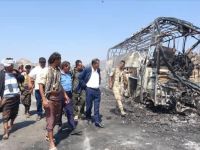Uganda and Sudan, which broke off relations in 1995, on Wednesday made fresh pledges to improve ties through stopping support of each other's rebels and exchanging diplomats.
Speaking to AFP after meeting his counterparts from Sudan, Libya and Egypt, Ugandan Foreign Minister Eriya Kategaya said "there were two main issues in resolving the impasse in our diplomatic relations."
"First we made sure that the LRA (the rebel Lord's Resistance Army) no longer poses a significant threat to Uganda and agreed to move them 1,000 kilometers (600 miles) away from the border, north of Juba," the minister said.
Kampala has long accused Khartoum of harboring the LRA in camps close to the Ugandan border.
In December, presidents Yoweri Museveni of Uganda and Omar al-Bashir of Sudan signed a deal in Nairobi that also contained pledges that, among several others, both states would stop backing the other's insurgents.
Very little came of this deal.
"We have never agreed on a distance before," Kategeya said optimistically about Wednesday's developments.
"I think this really was promising. Normally the Sudanese are evasive about the presence of the LRA on their territory but this time they seemed committed," he said.
The foreign ministers here also agreed that two Ugandan diplomats should with immediate effect be stationed in the Nairobi embassy in Khartoum and that two Sudanese should be posted at the Libyan embassy in Kampala.
The one-day meeting in Kampala, was also attended by representatives of the Carter Center, a group set up by former US president Jimmy Carter which brokered the Nairobi accord, and by observers from Canada and the United Nations agency for children, UNICEF.
Another meeting has been scheduled to be held in Khartoum on October 5 to work out a timetable for implementing Wednesday's agreement, Kategaya said.
Reiterating a pledge also made in Nairobi, the ministers agreed that a mechanism would be established to ensure that all Ugandan children abducted by the LRA are repatriated to Uganda.
Since the Nairobi meeting, about 80 of the estimated 1,500 children still in the LRA's hands have returned home and these are thought to have come from hospitals and the streets of the Sudanese capital, rather than having been rescued from rebel captivity.
At least 20 of these turned out to be Sudanese nationals.
Uganda also accepted Wednesday to have Libyan and Egyptian observers on her border to check on whether Uganda is indeed supporting the Sudan People's Liberation Army (SPLA), as alleged by Khartoum.
The SPLA has been waging war against successive Khartoum regimes since 1983 – KAMPALA (AFP)
© 2000 Al Bawaba (www.albawaba.com)







